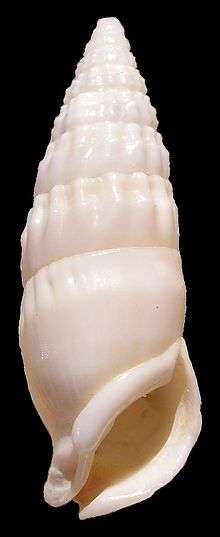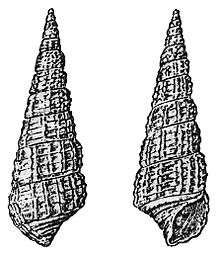Cerithiidae
Cerithiidae, common name the cerithiids or ceriths, is a large family of medium-sized marine gastropods in the clade Sorbeoconcha.
| Cerithiidae | |
|---|---|
 | |
| Apertural view of a shell of Rhinoclavis vertagus. | |
| Scientific classification | |
| Kingdom: | Animalia |
| Phylum: | Mollusca |
| Class: | Gastropoda |
| Clade: | Caenogastropoda |
| Superfamily: | Cerithioidea |
| Family: | Cerithiidae Fleming, 1822[1] |
| Diversity[2] | |
| 71 extant species of Bittiinae 114 extant species of Cerithiinae | |
Distribution
Ceriths are found worldwide on sandy bottoms, reef flats or coral reef rock covered with sand and algae in the sublittoral zone of warm or temperate waters. Most are found in tropical areas. A few occur along the European coastline and about 30 species in two genera are found along the American coast. A few species occur in estuarine areas of mangrove forests close to the sea. Only a few species of the subfamily Bittiinae are found in deep water.
Diet
Ceriths are herbivores and detritivores that graze the sea bed.
Description
Their slender shell is elongated with a pointed spire. They vary in size from 3 mm (Bittium alternatum) to 150 mm (Cerithium nodulosum). The smallest shells are found in the subfamily Bittiinae.
The many whorls have radial sculpture with axial ridges and nodules. The aperture shows at its base a vague curve or a distinct siphonal canal. The aperture is closed off by a thin oval brown operculum that is corneous and paucispiral. The palatal wall of the aperture is somewhat enlarged and often shows a varix.
The taenioglossan radula has seven teeth in each row. The single rachidian tooth is flanked on each side by one rhomboidal lateral tooth and two long, hook-like marginal teeth.
Subfamilies
The following three subfamilies have been recognized in the taxonomy of Bouchet & Rocroi (2005):[3]
- Alabininae Dall, 1927
- Bittiinae Cossmann, 1906[4]
- Cerithiinae Fleming, 1822 - synonyms: Rhinoclavinae Gründel, 1982; Colininae Golikov & Starobogatov, 1987
Bandel (2006)[5] used different classification: Bittiinae on its own family level named Diastomatidae (overview of WoRMS).
Some authors classify Argyropezinae Bandel, 2006 as a synonym of Bittiinae.[6]
Genera
Genera within the family Cerithiidae include:
- Alabininae Dall, 1927
- Alabina Dall, 1902 - type genus of the subfamily Alabininae, the type species of the genus Alabina is extinct[3]
- Bittiinae Cossmann, 1906
Bandel (2006) recognized a family Bittiidae Cossmann, 1906 [which should then be named Diastomatidae Cossmann, 1894 on the grounds of priority] with five subfamilies Bittiinae Cossmann, 1906 (usually placed in Cerithiidae following Houbrick, 1993), Finellinae Thiele, 1931, Alabininae Dall, 1927, Dialinae Kay, 1979 and Diastomatinae Cossmann, 1894. This contradicts Ponder (1994) who grouped Finella with Scaliola A. Adams, 1860 in a separate family Scaliolidae Jousseaume, 1912 [Scaliolidae is nevertheless kept distinct by Bandel (2006: 76) on the basis of having a shell agglutinating sand-grains]. It also contradicts Houbrick (1993) who holds the Bittiinae as a subfamily of the Cerithiidae.
It seems premature to reflect this scheme, which upsets current usage, in the WoRMS classification until shell characters are cross-checked with at least another independent (e.g. molecular) set of characters.
- Argyropeza Melvill & Standen, 1901
- Bittiolum Cossmann, 1906
- Bittium Gray, 1847 - type genus of the subfamily Bittiinae,[3] synonym: Dahlakia Biggs, 1971
- Cacozeliana Strand, 1928
- Cassiella Gofas, 1987
- Cerithidium Monterosato, 1884
- Ittibittium Houbrick, 1993
- Limatium Strong & Bouchet, 2018[7]
- Lirobittium Bartsch, 1911
- Neostylidium Doweld, 2013
- Pictorium Strong & Bouchet, 2013
- Varicopeza Gründel, 1976
- Zebittium Finlay, 1926
- Cerithiinae Fleming, 1822 (synonyms
- Colininae Golikov & Starobogatov, 1987; Rhinoclavinae Gründel, 1982)
- Cerithioclava Bruguière, 1789
- Cerithium Bruguière, 1789 - type genus of the subfamily Cerithiinae,[3] synonyms: Bayericerithium Petuch, 2001; Contumax Hedley, 1899; Thericium Monterosato, 1890
- Clavocerithium Cossmann, 1920
- Clypeomorus Jousseaume, 1888
- Colina H. Adams & A. Adams, 1854[3]
- Fastigiella Reeve 1848
- Gourmya Bayle, 1884
- Liocerithium Tryon, 1887
- Pseudovertagus Vignal, 1904
- Rhinoclavis Swainson, 1840[3] - synonyms: Clava Fabricius, 1823; Ochetoclava Woodring, 1928; Proclava Thiele, 1929; Vertagus Iredale, 1931
- Royella Iredale, 1912
- † Bezanconia Bayle in Fischer, 1884
- Genera brought into synonymy
- Subfamily Colininae Golikov & Starobogatov, 1987 : synonym of Cerithiinae Fleming, 1822
- Subfamily Rhinoclavinae Gründel, 1982: synonym of Cerithiinae Fleming, 1822
- Subfamily † Tiaracerithiinae Bouniol, 1981: synonym of Batillariidae Thiele, 1929
- † Elassum Woodring, 1946: synonym of Alabina Dall, 1902
- Stylidium Dall, 1907: synonym of Neostylidium Doweld, 2013
- Cacozelia Iredale, 1924: synonym of Cacozeliana Strand, 1928
- Cerithiolum Tiberi, 1869: synonym of Bittium Gray, 1847
- Clathrofenella Kuroda & Habe, 1954: synonym of Cerithidium Monterosato, 1884
- Dahlakia Biggs, 1971: synonym ofBittium Gray, 1847
- Inobittium Monterosato, 1917: synonym of Bittium Gray, 1847
- Manobittium Monterosato, 1917: synonym of Bittium Gray, 1847
- Rasbittium Gründel, 1976: synonym of Bittium Gray, 1847
- Stylidium Dall, 1907: synonym of Neostylidium Doweld, 2013
- Bayericerithium Petuch, 2001: synonym of Cerithium Bruguière, 1789
- Clava Fabricius, 1823: synonym of Rhinoclavis Swainson, 1840
- Contumax Hedley, 1899: synonym of Cerithium Bruguière, 1789
- Drillocerithium Monterosato, 1910: synonym of Cerithium Bruguière, 1789
- Gladiocerithium Monterosato, 1910: synonym of Cerithium Bruguière, 1789
- Gourmierium Jousseaume, 1894: synonym of Cerithium Bruguière, 1789
- Hirtocerithium Monterosato, 1910: synonym of Cerithium Bruguière, 1789
- Liocerithium Sacco, 1894: synonym of Liocerithium Tryon, 1887
- Lithocerithium Monterosato, 1910: synonym of Cerithium Bruguière, 1789
- Ochetoclava Woodring, 1928: synonym of Rhinoclavis Swainson, 1840
- Proclava Thiele, 1929: synonym of Rhinoclavis (Proclava) Thiele, 1929 represented as Rhinoclavis Swainson, 1840
- Vertagus Schumacher, 1817: synonym of Rhinoclavis Swainson, 1840
References
- Fleming, John (1822). The philosophy of zoology 2: 491.
- Strong E. E., Colgan D. J., Healy J. M., Lydeard C., Ponder W. F. & Glaubrecht M. (2011). "Phylogeny of the gastropod superfamily Cerithioidea using morphology and molecules". Zoological Journal of the Linnean Society 162(1): 43-89. doi:10.1111/j.1096-3642.2010.00670.x.
- Bouchet, Philippe; Rocroi, Jean-Pierre; Frýda, Jiri; Hausdorf, Bernard; Ponder, Winston; Valdés, Ángel & Warén, Anders (2005). "Classification and nomenclator of gastropod families". Malacologia. Hackenheim, Germany: ConchBooks. 47 (1–2): 1–397. ISBN 3-925919-72-4. ISSN 0076-2997.
- Cossmann (1906). Essais de paléoconchologie comparée 7: 64, 137.
- Bandel K. (2006). "Families of the Cerithioidea and related superfamilies (Palaeo-Caenogastropoda; Mollusca) from the Triassic to the Recent characterized by protoconch morphology - including the description of new taxa". Freiberger Forschungshefte C 511: 59-138. PDF.
- Gofas, S. (2011). Bittiinae. Accessed through: World Register of Marine Species at http://www.marinespecies.org/aphia.php?p=taxdetails&id=411649 on 2011-06-26
- Strong, E. E.; Bouchet, P. (2018). "A rare and unusual new bittiine genus with two new species from the South Pacific". ZooKeys (758): 1–18. doi:10.3897/zookeys.758.25100. PMC 5962629. PMID 29844710. Retrieved 3 April 2018.
- "Cerithiidae". Integrated Taxonomic Information System.
- Shells Tricity
- GBIF Archived March 3, 2016, at the Wayback Machine
- Houbrick R. S. (1978). The family Cerithiidae in the Indo-Pacific. Part 1. The genera Rhinoclavis, Pseudovertagus and Clavocerithium. Monographs of Marine Mollusca 1: 1-130.
- Houbrick R. S. (1992). Monograph of the genus Cerithium Bruguiere in the Indo-Pacific (Cerithiidae--Prosobranchia). 211 p., Smithsonian Institution Press (Washington, D.C.)], PDF.
External links
- Miocene Gastropods and Biostratigraphy of the Kern River Area, California; United States Geological Survey Professional Paper 642


